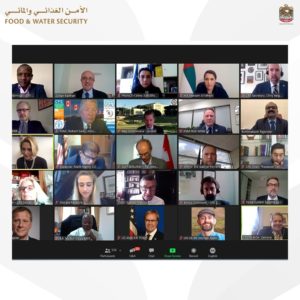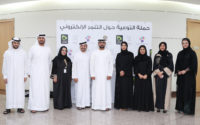H.E. Mariam Almheiri Participates In Virtual CFS High-Level Special Event Alongside Prominent Food Security Experts And Decision Makers
“What is required is nothing less than a complete paradigm shift in the way we produce food and our relationship with it,” asserted Her Excellency Mariam Almheiri, Minister of State for Food and Water Security, attheCFS High-Level Special Event, hosted on Zoom by the Committee on World Food Security (CFS) on October 13-15, 2020.
The event brought together prominent food security experts and decision makers to explore various means to strengthen global governance of food security and nutrition, as a prominent part of the global sustainable development agenda. The Special Event consisted of three plenary sessions – one per day – where attendees took stock of the global food security situation, and reflected on the impacts of the COVID-19 pandemic on global food security and nutrition, as well as the efforts needed to recover.
Furthermore, participants discussed the two ongoing CFS policy convergence processes on the Voluntary Guidelines on Food Systems and Nutrition, as well as the Agroecological and Other Innovative Approaches, and their potential contributions to the preparation of the UN Food Systems Summit.
“Global food systems are under unprecedented pressure. By 2050, the world’s food production and supply networks will need to sustainably feed ten billion people, meaning they will have to produce food to meet demand that will be 60% greater than it is today. We need to provide adequate nutrition for the 690 million people who are undernourished,” H.E. Almheiri
“The revised proposed CFS Voluntary Guidelines on Food Systems is a vital contribution to this goal of transformation, addressing as it does the complex factors relating to food security and their interrelationships that govern our ability to create a sustainable food security landscape and to ensure that we leave no person behind,” H.E. continued. “These proposed CFS guidelines are in alignment with what the UAE is doing to create a sustainable food secure future, reducing its environmental footprint across its entire food value chain; from using solar-powered desalination techniques to supply water for irrigation to its focus on Controlled Environment Agriculture that minimises the use of precious resources such as water.”
“The proposals’ socio-economic aspects also mirror the UAE’s approach with several national initiatives in place to support small shareholder farmers, such as providing them with shelves at all retailers, opening up tourism agriculture and encouraging the community to buy local,” H.E. Almheiri added. “Furthermore, the proposed CFS guidelines highlight the need for global and national cooperation on food safety. This is enshrined in the UAE’s National Food Security Strategy, which targets a 35% reduction in food safety incidences by 2021.”
The Minister of State for Food and Water Security said the UAE commends the commitment to ensuring agrobiodiversity in the CFS guidelines, in addition to promoting sustainable healthy diets through food and nutrition education. “The Food & Water Security Office has been active in educating its citizens through its Nutritional Labelling Policy and the National Nutritional Guidelines, which aims to ensure that citizens have tools to obtain nutritional advice to help improve the nutritional status of the UAE community for a more sustainable and healthier future,” H.E. noted.
H.E. Almheiri went on to highlight the focus on eliminating food waste in the CFS guidelines, asserting the UAE’s commitment to massively reducing the amount of food it throws away, with an interim target to reduce 15% of its food waste by 2021.
“The proposed CFS Voluntary Guidelines on Food Systems and Nutrition promises a holistic approach to the transformation of food systems – nothing less is needed to ensure all elements of the community are engaged in creating a future for food that is sustainable, healthy and biodiverse,” H.E. concluded.
H.E. Mariam Almheiri took part in the third plenary session on October 15(the final day of the event), titled ‘Food Systems Transformation’ – particularly in part four, which explored the contribution made by the two ongoing CFS policy processes towards sustainable food systems. Joining her on the panel were H.E. Julia Klöckner, Germany’s Federal Minister for Food and Agriculture; H.E. Limber Cruz, Minister for Agriculture of the Dominican Republic; and Henrietta Fore, Executive Director of UNICEF, among other high-profile and influential attendees.
The seven-part plenary sought to raise awareness on the two ongoing CFS policy processes and their role in guiding transformations required for sustainable food systems; mobilise the food security and nutrition community for early commitments on “uptake” of these CFS products; and examine the potential contribution of the CFS policy tools to the preparation of the UN FoodSystems Summit.
The Committee on World Food Security (CFS) was launched to be the most inclusive international and intergovernmental platform for all stakeholders to work together to ensure food security and nutrition for all. The Committee reports to the UN General Assembly through the Economic and Social Council (ECOSOC) and to the Food and Agriculture Organisation (FAO) Conference. The CFS High-Level Special Event seeks to promote food security and nutrition on the global sustainable development agenda. The 2020 virtual session is held in lieu of CFS 47, which has been rescheduled to February 8-12, 2021, in light of the COVID-19 pandemic.







